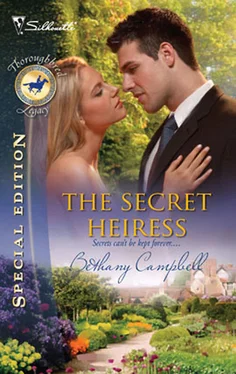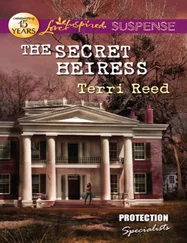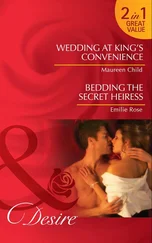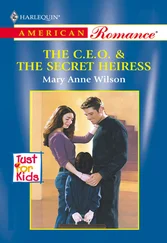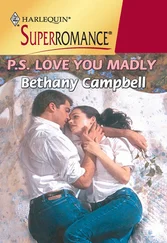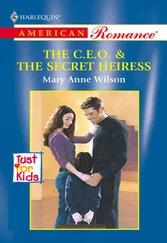“I don’t want that woman’s money,” Marie said firmly. “I can take care of myself.”
Reynard shrugged. “I wish I could say the same. If she was my gran, I’d feel her out. She might at least give me enough for better hearing aids. Why, there’s even doctors in England and America that say they can cure tinnitus.” He smiled philosophically. “But I’ve borne it this long, haven’t I? I can bear it for the few more years I’ve got.”
The few more years I’ve got. The words struck Marie hard. When she was young, she thought Colette would live forever. And Rennie, vital, mischievous, clever Rennie—why, if he could live by his wits, he’d never have to die. But he was aging. And mortal.
“It seems to me,” he said, “if she’s your gran, you might close a long, sad chapter in your family history. Bring about a sort of healing. A sort of—fairness. And forgiveness.”
Marie could say nothing.
“What do you say? Come back with me,” he urged. “It would do you good to get away for a while. You’ve worked yourself half to death with your school and your job and caring for Colie. Will you think about it at least? For me?”
Her head swam, and she felt emotionally exhausted. “I’ll think about it,” she said without conviction.
“Good girl,” he said with a disarming smile. He patted her hand. “Good girl.”
The next morning Reynard kept after her. He had an answer for her every argument. Perhaps Louisa would have helped Colette and her family—if only she’d known what had become of her daughter.
What was wrong with going to Fairchild Acres, just to see if Marie might like the old girl? “You could work there, you know. Observe her. She lost an assistant cook right before I left for here. You’d be the perfect replacement.”
“Go in as a spy?” Marie demanded, appalled. “And if I like her, pop up and say, ‘And by the way, I’m your long-lost granddaughter?’ No! It’s awful. It’d never work.”
Reynard then explained for a full hour why it would work. “Again, if you don’t like her, she never needs to know. You can leave and never look back.”
“I have to take my finals.”
“Take them early. You’ve got fine grades. Tell ’em your mother’s died and you’ve got family business to tend.”
“I have a job.”
“Colette said they think the world of you. They’d give you a leave of absence. Your apartment? Sublet it. It’s an excellent location, the uni so close.”
“I can’t.”
“You can’t not do it. It may be the chance of your lifetime.”
“I don’t want to talk about it. I’ve got to get ready for work.”
“Work, that’s all you ever do. You’ll end up like your mother. And she’d hate that.”
He made her head spin. She was glad to escape to the Scepter.
When she came home again, Reynard was watching television. He switched it off with the remote control. “Sit down with me,” he said. “I got news.”
Now what? she thought. But she sat. “Yes?”
“I phoned Mrs. Lipton,” he said with his most benevolent smile.
“And who, pray tell, is Mrs. Lipton?”
“Louisa Fairchild’s housekeeper. Lovely woman. I see her almost every day.”
“Why do you see her so often?” asked Marie. “And why’d you phone her?”
“I bring her eggs. The old girl—Miss Fairchild—likes her eggs fresh, but she won’t keep chickens. Afraid of birds. Was chased by a goose as a child.”
This was the first humanizing detail Marie had heard about the woman.
“I called Mrs. Lipton to ask if she was still in search of an assistant cook. She is.”
“Reynard…” Marie said in a warning tone.
“She’d found nobody suitable yet. So I told her about you, that you have your certificate in cookery and hospitality from the uni, that you work at the Scepter, that your mum was a cook, too, and she taught you to make wonderful desserts and pastries. She said you sounded perfect.”
“Reynard,” she exclaimed in shock. “How could you?”
“I told her you need a change of place with your mum just dead and all. So tomorrow just e-mail her some references or whatever. I didn’t tell her you were workin’ on a second certificate. Didn’t want you to sound overqualified. I told her it’d take you about two weeks to make arrangements to leave here. She said fine.”
She stood, torn between laughing or exploding in anger. “No. And that’s an end to it.”
That was not an end to it. He argued, he cajoled, he flattered, insisted, urged, coaxed, wheedled, pleaded and finally goaded. It was when he called her a coward that she snapped.
“You’re afraid,” he taunted. “You’ve never had an adventure in your life. I defy you to name a single one. You’re a lovely young woman, but you’re becoming a drudge. Now adventure comes knocking, and you pretend you’re not at home.”
Marie, sad, exhausted, worn down, finally agreed. She went to bed, wondering if she’d gone insane.
Reynard had to go back to Hunter Valley, and Marie, still filled with doubt, scurried to put her affairs in order. Always efficient, she’d finished her arrangements in just over a week.
Two days after he got back to Lochlain, Reynard phoned to say there’d been a spot of trouble at his employer’s, a stable fire, but not to be alarmed by anything she heard on the news; the fire had been contained. Nobody had been seriously hurt. All was well.
Marie, who had no time to follow current news, took him at his word and told him she’d see him soon. “I can’t believe I’m doing this, but I’m buying my bus ticket today.”
“No you’re not,” Reynard told her. “I got you a plane ticket to Newcastle. It’s only a skip and jump from there to Fairchild Acres. I’ll meet you at the airport.”
His generosity stunned her. He couldn’t afford such a gesture. “Reynard, you can’t. That’s too much money. I can’t allow it.”
“The ticket’s in the mail, duck. And like a duck, my duck, you will fly. Think of it not as a gift for you, but for Colie. It’d make her happy.”
She bit her lip so that she wouldn’t cry. “Thank you, Rennie. I’ll pay you back some day.”
“You’ll pay me back by coming here. And that’s your gift for Colie. To find out the truth about her and Louisa Fairchild.”
PART TWO
Hunter Valley, New South Wales
March
On a morning in early March, Marie found herself in a cramped economy seat on the cheapest airline out of Darwin. It was small and a bit shabby, but she was thrilled, for she’d never before been on a plane.
The inside of it looked no more glamorous than an elderly bus, but it was a magical thing, for it quickly whisked her up into the clouds and in an unbelievably short time, she was hundreds of kilometers away, in the Newcastle, New South Wales, airport, hugging Reynard.
He flinched at her tight embrace, and when she kissed his cheek, her lips touched a long cut just starting to heal. “Oof.” He drew back from her slightly, and she realized that under his work shirt she could feel something suspiciously like bandages.
“Rennie, what’s wrong?” she demanded.
“Oh, the bloody fire,” he said dismissively. “Cracked a few ribs, that’s all. Don’t worry, love. I’m a tough old bird, I am.”
Instantly she suspected his injury—and the fire—had been more serious than he’d let on. “Reynard, tell me more about this whole thing. Were you in the hospital?”
“Only overnight. Come on. Let’s go find your luggage. Ah, it’s lovely you look. Flying agrees with you?”
“It was wonderful,” she answered. “But I want to know more about what happened to you. And about the fire.”
Читать дальше
